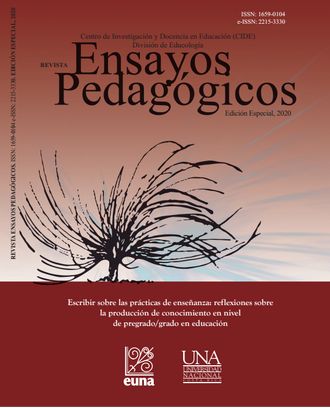The Teacher Training Process by Writing the Internship Report
DOI:
https://doi.org/10.15359/rep.esp-20-1.4Keywords:
internship report, teacher in training, other's speechAbstract
In this paper, our objective is to carry out an analysis on how undergraduate language interns mobilize the other’s speech to theoretically base the writing of the internship report. The discussion that we propose comes from the conception that the report is a statement produced as a responsive activity in the training process of future mother tongue teachers in the ways in which the interns understand theoretical points of view and how they relate to the reality observed in the classroom. For the proposed analysis, we support the conception of Bakhtin/Volóchinov (2006) about language as a dialogical activity and about the other’s speech in the production of statements. Our analysis objects are reports produced in different stages of the curricular internship, different writings, and space-times that help us to think about the displacements of students by mobilizing the foreign word for the construction and real comment on the meanings it carries.
References
Bachelard, G. (1996). A formação do espírito científico: contribuição para uma psicanálise do conhecimento. Rio de Janeiro: Contraponto.
Bakhtin, M. (2014). A pessoa que fala no romance. In: BAKHTIN, Mikhail. Questões de literatura e de estética: a teoria do romance. 7. ed. São Paulo: Hucitec Editora.
______. (2015). Discurso em Dostoievsky. In: BAKHTIN, Mikhail. Problemas da poética de Dostoiévski. 5. ed. Rio de Janeiro: Forense Universitária.
Bakhtin, M; Volóchinov, V. N. (2015). Discurso na vida e discurso na arte: sobre poética sociológica. Disponível em: www.uesb.br/ppgcel/Discurso-Na-Vida-Discurso-Na-Arte.pdf
______. (2006). Marxismo e filosofia da linguagem. 12. ed. São Paulo: HUCITEC.
Brasil. Ministério da Educação. (2015). Conselho Nacional de Educação. Resolução Nº 2, de 1º julho de 2015. Brasília, DF. Disponível em: http://pronacampo.mec.gov.br/images/pdf/res_cne_cp_02_03072015.pdf
Geraldi, J. W. (2010). A aula como acontecimento. São Carlos: Pedro & João Editores.
Universidade Federal do Rio Grande do Norte. (2008). Manual do estagiário. Natal: UFRN.
Published
How to Cite
Issue
Section
License
Ensayos Pedagógicos is subscribed to the Attribution-NonCommertial-NoDerivatives 4.0 International Creative Commons Licence, which allows both authors and readers to freely download, store, copy, and distribute the final approved publisehd version of the manuscript (post-print) as long as this is done without commercial purposes, no derivative works are generated, and the source and author are mentioned. As well, Ensayos Pedagógicos declares that authors will remain the rightful owners of the copyrights of their work in perpetuity.







